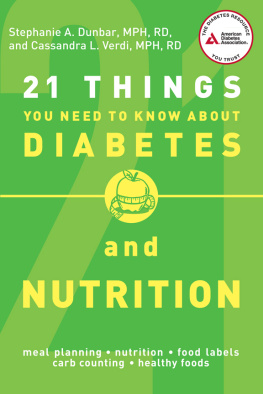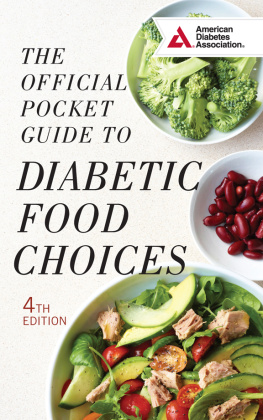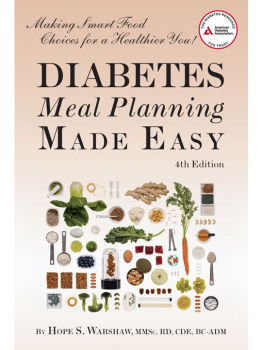
Director, Book Publishing, Abe Ogden; Managing Editor, Greg Guthrie; Acquisitions Editor, Victor Van Beuren; Editor, Lauren Wilson; Production Manager, Melissa Sprott; Composition, ADA; Cover Design, Jody Billert; Printer, Versa Press.
2014 by the American Diabetes Association, Inc. All Rights Reserved. No part of this publication may be reproduced or transmitted in any form or by any means, electronic or mechanical, including duplication, recording, or any information storage and retrieval system, without the prior written permission of the American Diabetes Association.
Printed in the United States of America
1 3 5 7 9 10 8 6 4 2
The suggestions and information contained in this publication are generally consistent with the Clinical Practice Recommendations and other policies of the American Diabetes Association, but they do not represent the policy or position of the Association or any of its boards or committees. Reasonable steps have been taken to ensure the accuracy of the information presented. However, the American Diabetes Association cannot ensure the safety or efficacy of any product or service described in this publication. Individuals are advised to consult a physician or other appropriate health care professional before undertaking any diet or exercise program or taking any medication referred to in this publication. Professionals must use and apply their own professional judgment, experience, and training and should not rely solely on the information contained in this publication before prescribing any diet, exercise, or medication. The American Diabetes Associationits officers, directors, employees, volunteers, and membersassumes no responsibility or liability for personal or other injury, loss, or damage that may result from the suggestions or information in this publication.
 The paper in this publication meets the requirements of the ANSI Standard Z39.48-1992 (permanence of paper).
The paper in this publication meets the requirements of the ANSI Standard Z39.48-1992 (permanence of paper).
ADA titles may be purchased for business or promotional use or for special sales. To purchase more than 50 copies of this book at a discount, or for custom editions of this book with your logo, contact the American Diabetes Association at the address below, at booksales@diabetes.org, or by calling 703-299-2046.
American Diabetes Association
1701 North Beauregard Street
Alexandria, Virginia 22311
DOI: 10.2337/9781580405140
Library of Congress Cataloging-in-Publication Data
Dunbar, Stephanie.
21 things you need to know about diabetes and nutrition / by Stephanie Dunbar and Cassandra Verdi.
pages cm
Summary: By using these healthy tips, this book will help the reader make the connection between healthy eating and managing diabetes-- Provided by publisher.
Includes bibliographical references and index.
ISBN 978-1-58040-514-0 (pbk.)
1. Diabetes--Diet therapy. 2. Diabetics--Nutrition. 3. Diabetics--Health and hygiene. I. Verdi, Cassandra. II. Title. III. Title: Twenty-one things you need to know about diabetes and nutrition.
RC662.D86 2013
616.4620654--dc23
2013010805
eISBN: 978-1-58040-590-4
For my parentsthank you for your love and support and for always being there for me.
Stephanie
To my mom and dadfor their support, gentle guidance, and encouragement all of these years.
Cassie
Table of Contents
There are many people wed like to thank for their contributions to this book. First, wed like to recognize Abe Ogden for giving us this unique opportunity to answer the most commonly asked questions about nutrition and diabetes.
A special thanks to Greg Guthrie. We greatly appreciate your patience, kindness, and guidance throughout the writing process. To Victor Van Beuren, for answering many questions along the way and for all of your moral support. To Kelly Rawlingsthank you for sharing your way with words during the writing process. Thanks to Lauren Wilson for doing a wonderful job with copyediting the bookyouve been a joy to work with. Wed also like to thank Melissa Sprott for her hard work on the design and layout of this book.
Many thanks to Sue Kirkman, Jane Chiang, and Bob Ratner for the opportunities you have provided and your encouragement and support to expand our work at the Association, including writing this book.
Wed also like to recognize Alison Evert and Sue McLaughlin for their thorough review of this book. We are very grateful for your willingness to share your expert insight into the world of diabetes. A big thank you to Lyn Wheeler for your analysis of our recipes and, more importantly, for being a mentor and lending your time and expertise to advise on many of our projects.
There are many dedicated Association volunteers and colleagues who have contributed to our work at the Association. In doing so you have touched our lives, made our work enjoyable, served as mentors, and become friends. Thanks to all of you.
Stephanie and Cassie
Its impossible not to mention and thank my husband, Jimmy Verdi.
You bring so much joy to my life every day, and I am incredibly grateful for your constant encouragement to pursue my dreams.
Cassie
Matthew, thank you for your enthusiasm and your help keeping the book a surprise for a really long time!
Mom
There are many aspects to managing diabetes. For many people, making food choices is the most challenging. What you eat and how much you eat has a direct effect on your blood glucose level, your risk of developing complications, and many other health factors.
Food is made up of a mix of carbohydrate, protein, and fat. You can think of these as the building blocks for your body. Healthy foods not only provide those building blocks, they provide the extra bonus of vitamins, minerals, and fiber. Choosing healthy foods is the best way to give your body the energy it needs to do daily activities and the things that you love!
Following a healthy, balanced meal plan can help you:
Lower your A1C (average blood glucose over the past 23 months)
Lower your blood pressure
Improve your cholesterol levels
Lose weight or maintain your current weight
Increase your energy level
Prevent or delay diabetes complications
What Is a Diabetes Diet?
People often ask which diet is best for managing diabetes. But there is no ideal diet or meal plan that works best for everyone with diabetes. In fact, research has shown that many different ways of eating can work for people with diabetes. The types of meal plans that can be used to manage diabetes include Mediterranean style, low fat, lower carbohydrate, vegetarian, and the DASH (Dietary Approaches to Stop Hypertension) eating pattern.
For people who are overweight, cutting calorie intake is important regardless of the type of meal plan they follow, because it helps with weight loss. Losing a moderate amount of weight can make it easier to control A1C, blood pressure, and cholesterol levels. A moderate amount of weight is about 7% of your body weight. For a person who weighs 200 pounds, for example, that is about 14 pounds.
What Is a Meal Plan?
A meal plan is a guide that tells you how much and what kinds of food to choose at meals and snack times. Some people may refer to a meal plan as an eating plan, food plan, or diet. All of these essentially mean the same thing. Your plan should fit your schedule, culture, and eating habits. The right plan for you should help you keep your blood glucose, blood pressure, cholesterol, and weight on track. For more information on how to create a healthful meal plan, see .
Next page














 The paper in this publication meets the requirements of the ANSI Standard Z39.48-1992 (permanence of paper).
The paper in this publication meets the requirements of the ANSI Standard Z39.48-1992 (permanence of paper).